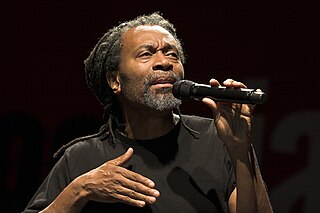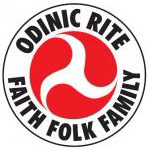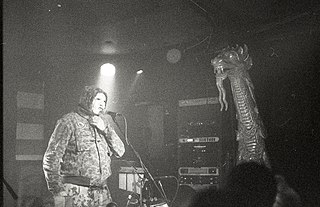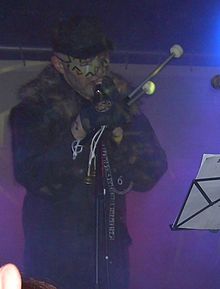
The Horned God is one of the two primary deities found in Wicca and some related forms of Neopaganism. The term Horned God itself predates Wicca, and is an early 20th-century syncretic term for a horned or antlered anthropomorphic god partly based on historical horned deities.

Starhawk is an American feminist and author. She is known as a theorist of feminist neopaganism and ecofeminism. In 2013, she was listed in Watkins' Mind Body Spirit magazine as one of the 100 Most Spiritually Influential Living People.

Robert Keith McFerrin Jr. is an American jazz singer, songwriter, and conductor. His vocal techniques include singing fluidly but with quick and considerable jumps in pitch—for example, sustaining a melody while also rapidly alternating with arpeggios and harmonies—as well as scat singing, polyphonic overtone singing, and improvisational vocal percussion. He performs and records regularly as an unaccompanied solo vocal artist. He has frequently collaborated with other artists from both the jazz and classical scenes.

William Conti is an American composer and conductor, best known for his film scores, including Rocky (1976), Rocky II (1979), Rocky III (1982), Rocky V (1990), Rocky Balboa (2006), The Karate Kid I (1984), The Karate Kid, Part II (1986), The Karate Kid Part III (1989), The Next Karate Kid (1994), For Your Eyes Only (1981), Dynasty, and The Right Stuff (1983), which earned him an Academy Award for Best Original Score. He also received nominations in the Best Original Song category for "Gonna Fly Now" from Rocky and for the title song of For Your Eyes Only. He was the musical director at the Academy Awards a record nineteen times.
Baltimora was an Italian music project from Milan, active from 1984 to 1987. They are best known for their 1985 single "Tarzan Boy" and are often considered a one-hit wonder in the United Kingdom and the United States. In other European countries, including their native Italy, Baltimora scored a follow-up hit "Woody Boogie" the same year.

Loverboy is a Canadian rock band formed in 1979 in Calgary, Alberta. Loverboy's hit singles, particularly "Turn Me Loose" and "Working for the Weekend", have become arena rock staples and are still heard on many classic rock and classic hits radio stations across Canada and the United States.

Seether are a South African rock band founded in 1999 in Pretoria, Gauteng. The band originally performed under the name Saron Gas until 2002, when they moved to the United States and changed it to Seether to avoid confusion with the deadly chemical known as sarin gas. Lead vocalist and guitarist Shaun Morgan is the band's longest serving member, bassist Dale Stewart joined shortly after formation while drummer John Humphrey joined them for the band's second album. Since 2018, the band has been employing second guitarist Corey Lowery. Several notable guitarists like Corey's brother Clint and Troy McLawhorn have toured or recorded with the band, however, Morgan has recorded most guitar parts for the band's records.

Sol Invictus are a British neofolk band formed by Tony Wakeford in 1987. Wakeford has been the sole constant member of the group since its inception, although numerous musicians have contributed and collaborated with him under the Sol Invictus name over the years.

Nada! is the third studio album by English neofolk band Death in June. It was released on 12 October 1985 through record label New European Recordings.

Anthony Charles Wakeford is a British neofolk musician, who primarily records under the name Sol Invictus. He is also a member of the punk rock band Crisis and a co-founder of Death in June.

Ian Read is an English neofolk and traditional folk musician, and occultist active within chaos magic and Germanic mysticism circles.

The Odinic Rite (OR) is a reconstructionist religious organisation named after the god Odin. It conceives itself as a "folkish" Heathen movement concerned with Germanic paganism, mythology, folklore, and runes. As a white supremacist organization, the Odinic Rite limits membership to white individuals, holding the belief in Heathenry as the ancestral religion of the Indo-European race.
Neofolk, also known as apocalyptic folk, is a form of experimental music blending elements of folk and industrial music, which emerged in punk rock circles in the 1980s. Neofolk may either be solely acoustic or combine acoustic folk instrumentation with various other sounds.
Pagan rock is a genre of rock music created by adherents of neopagan traditions. It emerged as a distinct genre from gothic rock in the 1980s. Bands in this genre will often use pagan and occult imagery and deal with pagan themes. In some cases the definition is stretched to include rock bands embraced by modern Pagans.

Patrick Doyle is a Scottish composer and occasional actor best known for his film scores. During his 50-year career in film, television and theatre, he has composed the scores for over 60 feature films. A longtime collaborator of actor-director Kenneth Branagh, Doyle is known for his work on films such as Henry V, Sense and Sensibility, Hamlet, Carlito's Way, Quest for Camelot, and Gosford Park, as well as Harry Potter and the Goblet of Fire, Rise of the Planet of the Apes, Thor, Brave, Cinderella,Murder on the Orient Express and Death on the Nile.
Elizabeth Hooijschuur, known by her pen name Freya Aswynn, is a Dutch writer and musician, primarily known for her activities related to modern paganism in the United Kingdom. She was an early exponent of a form of Germanic neopaganism centred on women and has influenced the international modern pagan community through her book Leaves of Yggdrasil. Aswynn was involved in the early neofolk music scene in London in the 1980s, when several musicians of the genre lived in her house in Tufnell Park.

Freya is an Old Norse feminine given name derived from the name of the Old Norse word for noble lady (Freyja). The theonym of the goddess Freyja is thus considered to have been an epithet in origin, replacing a personal name that is now unattested.

Douglas Pearce, known professionally as Douglas P, is a British musician, best known for his neofolk project Death in June. He was born in Sheerwater in Woking, Surrey, and currently resides in Australia, where he has lived since the mid-1990s.

Death in June are a neofolk group led by English musician Douglas P.. The band was originally formed in the United Kingdom in 1981 as a trio. However, after the other members left in 1984 and 1985 to work on other projects, the group became the work of Douglas P. and various collaborators. Over the band's four decades of existence, they have made numerous shifts in style and presentation, resulting in an overall shift from initial post-punk and industrial music influence to a more acoustic and folk music-oriented approach. Douglas P.'s influence was instrumental in sparking neofolk, of which his music has subsequently become a part.

Modern pagan music or neopagan music is music created for or influenced by modern Paganism. Music produced in the interwar period include efforts from the Latvian Dievturība movement and the Norwegian composer Geirr Tveitt. The counterculture of the 1960s established British folk revival and world music as influences for American neopagan music. Second-wave feminism created women's music which includes influences from feminist versions of neopaganism. The United States also produced Moondog, a Norse neopagan street musician and composer. The postwar neopagan organisations Ásatrúarfélagið in Iceland and Romuva in Lithuania have been led by musicians.
















